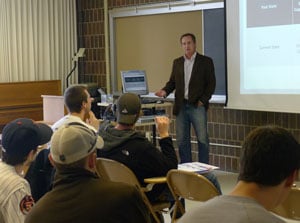Books stay closed for the day
Students hear from marketing professionals about real life situations
April 8, 2011
By Barbara Hein

SWOT analysis...the 4 P's of marketing...strategic planning...ethical decision making...consumer behavior. All of these are concepts and theories that students in Cheryl Kelley-Bowman's Principles of Marketing class have been studying this semester. On April 1, the students took a break from the books to see these concepts put into action.
Marketing professionals Julie Heck and Steve Dunn joined the class to share their story of how they incorporated these concepts at their company and ended up tripling revenue from new products, all during a down economy. Heck and Dunn are part of the marketing team for Skyline Exhibits, an Eagan, Minn., based company that was named a 2010 Product Development and Management Association (PDMA) "Outstanding Corporate Innovator Award" finalist. The designation puts Skyline alongside previous companies recognized by PDMA such as FedEx, BMW, and DuPont.
"We set out to change the development process at our company," Dunn said. "We realized we had been more focused on internal issues, like how much it would cost to produce something, rather than on what the customers needed."
Students heard how Skyline reinvented itself; by reinventing how the company does new product development. They applied a focus to the front end of development — taking time to visit customers and observe how they do their jobs and what their needs are. The result was an increase in new product development revenue from 6-percent to 22-percent.
"We learned that marketing cannot succeed on its own. Engineering cannot succeed on its own. Design cannot succeed on its own. We have to come together and collaborate on our products and ideas for the future," Heck told the students.
Students appreciated seeing how the theory they've been studying in the books, can be applied in real life.
"I was impressed with how innovative the company was. They were willing to takes risks and use various tools and concepts to ensure they focused on customer needs," Kerry Daigs said.
The sophomore communication major from Los Angeles, Calif., said he found it interesting to hear how the company chose not to compete on price, especially in a down market. By closing the books for a day and hearing from these marketing professionals, Daigs and the other students gained a new appreciation of how to actually use the concepts they've read about when they enter the business world after graduation.
